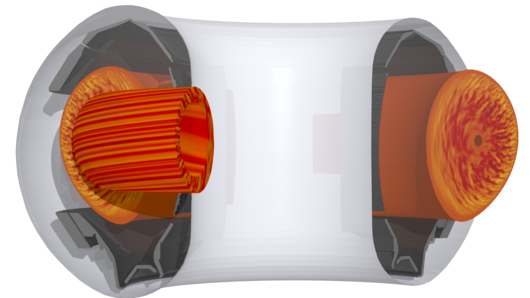Höchstleistungsrechenzentrum Stuttgart

12. Jan. 2026
09:00
16. Jan. 2026
17:00
Englisch
Fortgeschritten
ThemenbereicheWissenschaftliche Visualisierung
ThemenCode-Optimierung
Numerische Strömungsmechanik
Green IT & Nachhaltigkeit
Numerische Simulation
Visuallisierung
The training is addressed to plasma turbulence specialists and/or PhD/Master students, who want to learn (or improve their knowledge of) corresponding GENE/GENE-X simulations skills.
The presentation times listed in the agenda are tentative.
1st day – Monday, 12 January 2026
12:45 - 13:00 Join in
13:00 - 13:10 Welcome
13:10 - 13:55 Introduction to GENE - GENE Family, Physics Models used in GENE
13:55 - 14:40 GENE - Numerical Methods
14:40 - 15:10 Break
15:10 - 15:55 GENE - optimization approaches
15:55 - 16:40 Post-processing GENE generated files
16:40 - 17:00 Q & A and requests for the next day
2nd day – Tuesday, 13 January 2026
09:00 - 10:00 Installing and Running GENE - basic introduction
10:00 - 11:00 Setting up GENE simulations - avoiding pitfalls on CPU/GPU, parameter scans, etc
11:00 - 11:15 Break
11:15 - 12:00 Hands-On Session I: Starting a number of GENE flux-tube simulations
12:00 - 13:30 Lunch
13:30 - 14:30 Hands-On Session II: Flux-tube simulations and analysis
14:30 - 15:00 Break
15:00 - 16:30 Hands-On Session III: Global GENE simulations
16:30 - 17:00 Q & A and closing
3rd day – Wednesday, 14 January 2026
09:00 - 10:30 Introduction to GENE-X for users
10:30 - 11:00 Break
11:00 - 11:45 Installing the code: first steps
11:45 - 13:00 Lunch
13:00 - 14:00 Parameters required for a GENE-X simulation
14:00 - 15:00 Hands on: installation and first steps
15:00 - 15:30 Break
15:30 - 17:00 Hands on: setting up a simulation test case
4rd day – Thursday, 15 January 2026
09:00 - 10:15 Overview of GENE-X postprocessing tools
10:15 - 10:30 Break
10:30 - 11:00 How to install the Torx library
11:00 - 12:00 Hands on: installation of Torx and first steps
12:00 - 13:30 Lunch
13:30 - 15:00 Creating your own postprocessing notebooks with Torx
15:00 - 15:30 Break
15:30 - 16:15 Optimize simulation performance
16:15 - 17:00 Simulation pitfalls
5th day – Friday, 16 January 2026
09:00 - 10:15 GENE-X equilibrium and data preprocessing
10:15 - 10:30 Break
10:30 - 12:00 Hands on: bring your own case to preprocess
12:00 - 13:30 Lunch
13:30 - 14:45 Hands on: setup your own case
14:45 - 15:00 Break
15:00 - 16:40 Reserved for requests / Closing
A link to the course material (slides and exercises) will be available at course start
Register via the button at the top of this page.
This course will be hybrid, i.e. it will take place at the Max Planck Computing & Data Facility (MPCDF) in Garching on-site but it will also be possible to attend online. Participants, online as well as on-site, have to be aware and agree that they might appear in the live video stream taken by a camera in the back of the lecture room or by a webcam on laptops. We strongly recommend to attend this course on-site since on-site attendance is much more effective and efficient in our experience, also this helps to foster collaborations and community-building. Therefore we might give priority to on-site over online participants during registration.
Please be aware that the Zoom session will be recorded. You declare that you are aware of and consent to the recording by registering.
Registration closes on Monday, 5 January 2026.
Students without Master's degree or equivalent. Participants from EU or EuroCC countries only: 0 EUR
PhD students or employees at a German university or public research institute: 0 EUR
PhD students or employees at a university or public research institute in an EU or EuroCC country other than Germany: 0 EUR.
Other participants, e.g., from industry, other public service providers, or government. Participants from EU or EuroCC countries only: 0 EUR
Our course fee includes coffee breaks (in classroom courses only).
For lists of EU and EuroCC countries have a look at the Horizon Europe and EuroCC website.
Only participants from institutions belonging to these countries can take part in this course.
Tobias Haas phone 0711 685 87223, training(at)hlrs.de
HLRS is part of the Gauss Centre for Supercomputing (GCS), together with JSC in Jülich and LRZ in Garching near Munich. SIDE is the German National Competence Centre (NCC) for High-Performance Computing. HLRS is also a member of the Baden-Württemberg initiative bwHPC.
Since 2025, HLRS has been coordinating one of the AI Factories of the EuroHPC JU: HammerHAI.
This is a joint training event of Max Planck Institute of Plasma Physics (IPP), Max Planck Computing and Data Facility (MPCDF) in collaboration with the Plasma-PEPSC CoE and SIDE, ENCCS.
Within the scope of the EuroCC2 project this training is offered free of charge. By participating in a training free of charge, companies receive state-aid corresponding to the regular market-prices listed in the service portfolio. Please note state-aid regulations in Germany.
EuroCC 2 and EuroCC4SEE have received funding from the European High-Performance Computing Joint Undertaking (JU) under grant agreement No 101101903 and No 101191697. The JU receives support from the European Union’s Digital Europe Programme and Germany, Bulgaria, Austria, Croatia, Cyprus, Czech Republic, Denmark, Estonia, Finland, Greece, Hungary, Ireland, Italy, Lithuania, Latvia, Poland, Portugal, Romania, Slovenia, Spain, Sweden, France, Netherlands, Belgium, Luxembourg, Slovakia, Norway, Türkiye, Republic of North Macedonia, Iceland, Montenegro, Serbia, Bosnia and Herzegovina.


See the training overview and the Supercomputing Academy pages.
See also information about the HLRS training department and staff.
März 02 - 06, 2026
Stuttgart
Englisch
März 23 - Apr. 17, 2026
Hybrid, Stuttgart
Englisch
März 23 - 27, 2026
Hybrid, Stuttgart
Englisch
Apr. 21 - 24, 2026
Online
Englisch
Juni 01 - 02, 2026
Online
Englisch
Juni 15 - 19, 2026
Hybrid, Stuttgart
Englisch
Aug. 31 - Sept. 01, 2026
Stuttgart
Englisch
Sept. 02 - 03, 2026
Stuttgart
Englisch
Sept. 07 - 11, 2026
Stuttgart
Englisch